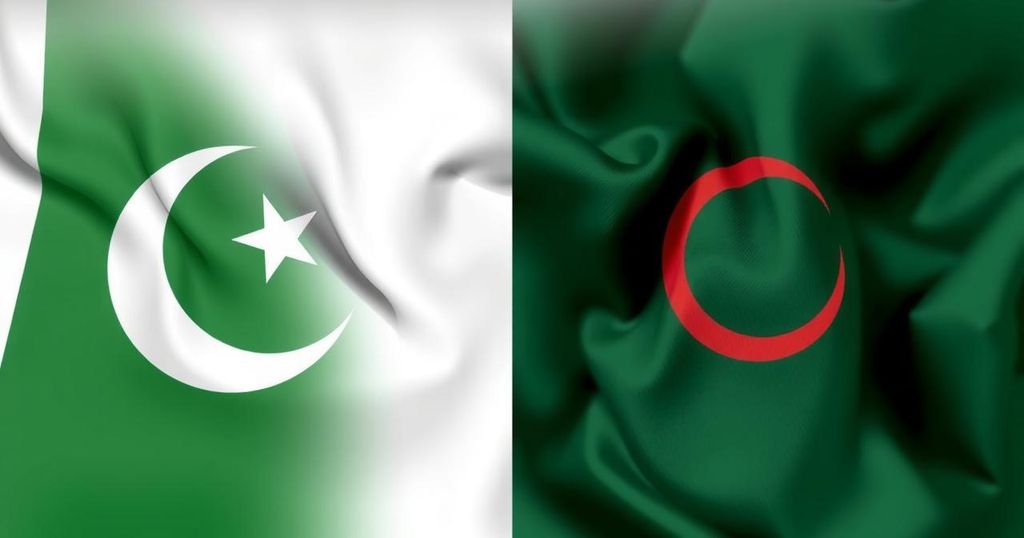Pakistan’s Foreign Minister Ishaq Dar will visit Bangladesh next month, marking the first official visit in over a decade amid improving ties post Sheikh Hasina’s ousting. Bangladesh’s interim adviser Muhammad Yunus has also accepted an invitation to visit Pakistan. Relations between the countries have begun to strengthen with lifted trade restrictions and new diplomatic engagement.
The upcoming visit of Pakistan’s Foreign Minister Ishaq Dar to Bangladesh next month marks a significant diplomatic development, being the first such visit in over a decade. This visit is perceived as a strengthening of ties between Islamabad and Dhaka, particularly following the political changes in Bangladesh after Prime Minister Sheikh Hasina was ousted in August last year. Notably, this will be the first visit by a Pakistani foreign minister since Hina Rabbani Khar’s trip in 2012. Minister Dar confirmed that he would be visiting Dhaka at the invitation of his Bangladeshi counterpart while also mentioning that Bangladesh’s interim government chief adviser, Muhammad Yunus, has accepted an invitation to visit Islamabad.
Historically, relations between the two countries have faced challenges during Sheikh Hasina’s 16-year leadership, due to her alignment with India and refusal to engage in dialogue with Pakistan. However, recent developments suggest that their relationship is on the mend. Following the change in government, several high-level exchanges have occurred, and Bangladesh has reinstated some trade avenues, lifting restrictions on Pakistani exports and facilitating direct trade via maritime routes. At a press conference, Dar referred to Bangladesh as a “brother country,” expressing Pakistan’s commitment to supporting Bangladesh.
Complications arose with the recent announcement that Pakistani citizens could now apply for Bangladeshi visas without requiring security clearance, a policy change that could impact regional security dynamics. This shift follows the BNP’s historical closeness with Pakistan, diverging from Hasina’s approach. The tensions between Bangladesh and India have also escalated due to political changes and violence against Hindus, exacerbating the complex geopolitical landscape in the region. Hasina’s exile in India has intensified the scrutiny on Bangladesh’s evolving governance under Yunus, now fraught with increased discontent and sectarian issues.
In summary, Minister Dar’s forthcoming visit to Bangladesh represents a pivotal moment in re-establishing diplomatic relations that had been strained for years. It highlights a potential shift in policies and alliances that could reshape the future of both countries.
The relationship between Pakistan and Bangladesh has been historically complicated, influenced heavily by the political climate and leadership. For the past 16 years, under Prime Minister Sheikh Hasina’s governance, ties were notably strained as she aligned politically with India, often sidelining Pakistan. Diplomatic efforts from Islamabad were continually rebuffed, further entrenching the divide. However, the political upheaval following Hasina’s ouster in August last year has created a new landscape for diplomatic engagement, fostering an opening for renewed cooperation between the two neighboring countries. The shift to an interim government led by Muhammad Yunus, who has indicated a willingness to engage with Pakistan, has prompted a reevaluation of bilateral relations.
The anticipated visit by Pakistani Foreign Minister Ishaq Dar to Bangladesh in February signals a notable warming of relations between the two nations, primarily after a significant period of tension under the leadership of Sheikh Hasina. The recent changes in governance in Bangladesh and the lifting of prior restrictions on trade and visas reflect a commitment to fostering a more cooperative regional environment. Both countries stand at a crucial juncture where improved bilateral ties could yield considerable benefits, particularly in trade, security, and diplomatic engagements.
Original Source: www.business-standard.com






